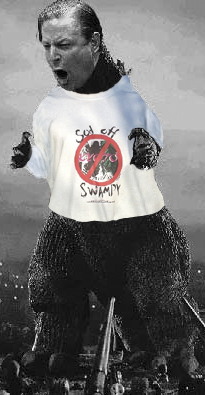Spot on!
An excellent op-ed in the Disturber today (our local bird cage liner)by Bill Ward, below for those who do not wish to register…
Posted on Thu, Jul. 07, 2005
The other legacy of slavery
Some blacks are thankful ancestors left Africa — even as slaves in chains
From Bill Ward, a historical researcher and writer living in Salisbury:
Before Wachovia Bank Chairman and CEO Ken Thompson and his Bank of America counterpart Ken Lewis do too much hand wringing about their companies’ past ties to slavery, they should set aside “white guilt” and consider the issue from a historical perspective. If they don’t, they’ll be fair game for every race-baiting extortionist that comes along.
The morally reprehensible practice of slavery existed for thousands of years among every ethnic and racial group. Slavery still exists in the Middle East and Africa.
Slaves constituted an estimated three-quarters of West African exports in the 18th century. In 1807 more slaves were in Africa than in the Americas. Without African chiefs’ willingness to sell fellow Africans, the slave trade wouldn’t have flourished in the Western hemisphere.
How has slavery affected the millions of blacks who live and work in this country today?
Keith Richburg was a Washington Post correspondent and bureau chief in Africa for three years. In his book, “Out of America: A Black Man Confronts Africa,” he describes what he witnessed there: the descent of Somalia into a warlord domain; the mass butchery of Tutsis by rival Hutus in Rwanda; the murderous rampages of bewigged young men in Liberia; the AIDS pandemic across the continent; the rampant crime and violence in South Africa.
Tracing his ancestors’ journey from Africa to a slave auction in Charleston, S.C., Richburg concluded: “Thank God my ancestor got out, because, now, I am not one of them [present-day Africans]. …[T]hank God I am an American.”
Slave ownership in this country was not a white-only business. The 1830 U.S. Census showed that 3,775 free Negroes owned 12,760 slaves. In North Carolina 69 free Negroes were slave owners. Two black residents of Colleton District, S. C., Justus Angel and Mistress L. Horry, each owned 84 slaves, placing them in the ranks of slave magnates — those who owned 50 or more slaves. In 1860, one of the wealthiest men in South Carolina (top 10 percent) was William Ellison, a freed slave who owned 63 slaves.
No one can offer a view of slavery better than one who has been a slave, such as Booker T. Washington. In “Up From Slavery,” he wrote:
“I have long since ceased to cherish any spirit of bitterness against the Southern white people on account of the enslavement of my race. No one section of our country was wholly responsible for its introduction, and, besides, it was recognized and protected for years by the General Government…. [W]hen we rid ourselves of prejudice, or racial feeling, and look facts in the face, we must acknowledge that, notwithstanding the cruelty and moral wrong of slavery, the ten million Negroes inhabiting this country, who themselves or whose ancestors went through the school of American slavery, are in a stronger and more hopeful condition, materially, intellectually, morally, and religiously, than … an equal number of black people in any other portion of the globe.”
Black Americans’ struggle for recognition and prosperity has not been easy. Those who work for corporate giants such as Wachovia and Bank of America stand as proud examples of the merits of education and diligent effort.
Those who prefer to present blacks as perpetual victims and whites as their victimizers should heed H. L. Mencken: “The more noisy Negro leaders, by depicting all whites as … enemies to their race, have done it a great disservice. Large numbers of whites who were formerly very friendly to it, and willing to go to great lengths to help it, are now resentful and suspicious.”
Corporate leaders owe themselves and their stockholders a strong defense against intimidation by fast-buck operators seeking deep pockets under the guise of make-believe justice.
——————————————————————————–
For The Record offers commentaries from various sources. The views are the writer’s, and not necessarily those of the Observer editorial board. Contact Bill Ward at wardwriters@bellsouth.net.

Woo hoo! Well Said!